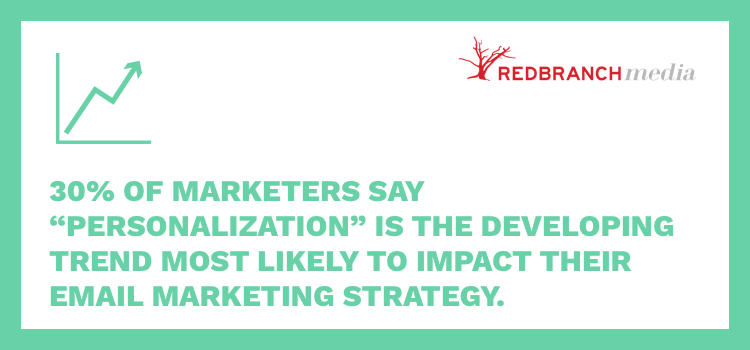By Jimmy Schleisman:
My Body is Ready for Personalized Email
Imagine a world where you don’t have to create separate emails to redirect those hundreds of retail ads and promotions out of your inbox. All those memberships and random stores you gave your email to now send you one-on-one messages that actually cater to the products and services you enjoy and frequently buy. Just think, your favorite brands spend time actually interacting with you about YOUR interests.
What is in store for the future of #EmailMarketing? Take a look at a few of these predictions: Share on XNo more carbon-copy, mass-blasted messages flooding your inbox. No more “99+ unread messages” notification sticker on your spam and junk mail. No hassle, no BS. Just you, your favorite companies and how they can help you.

Crazy, right?
The focus of email marketing, and even marketing in general, is growing around consumer-experiences. Creating relationships with consumers through these experiences is a business’s surest way to improve the quality and lifespan of their marketing strategies.
Automated Recommendations Did It First
Companies that use “recommendation” software and algorithms in their websites are disrupting the industry and changing the way we view marketing tools. Spotify creates playlists based on your listening history, Netflix compiles new movies and shows based on what you frequently watch and Amazon organizes shopping catalogues based on your recent purchases and shopping searches.
These companies, and many more like them, personalize the user experience to cater to each individual consumer. Recommendations function as a consumer-oriented marketing tool that reaches out and connects with a business’s target audience. It helps build relationships with consumers by appealing to their interests and providing them with convenient, time-saving services (i.e. it helps consumers feel like their interests are also the business’s interests).

That being said, I reeeeally hate shopping. Both in-store and online. Rummaging through clothing racks and clearance sale bins takes up too much time. Imagine physically digging your way through all the mountains of stuff available for sale on Amazon just to find another pair of your favorite socks. That’s like trying to find a needle in a haystack of other needles.
Ain’t nobody got time for that.
That’s where recommendations come in to save the day all superhero spandex-and-cape style. They remember the things you frequent and offer similar alternatives as soon as you start your shopping search. Above all else, automated recommendations build and connect marketing bridges to consumers in ways traditional email never could. In a fraction of the time it would take an internal team to design and implement a solid email campaign, marketers can gather data on consumers and provide them with content that fits their lifestyles.
Think I’m kidding? Go to your Netflix account right this second. Press play on some totally random, weird-looking anime show and watch how fast Netflix builds your ass a three-week bingefest of related shows they think you can’t live without. Companies like Netflix pool user data that enables their software to cross-reference consumers’ interests. They’ll mash-up your love of sci-fi, rom-coms, and 16th-century British aristocratic dramas to find you a show that somehow magically combines all three genres into one giant, swashbuckling love story.
You’ll love every second of it because a) the new show Netflix found for you is literally everything you could’ve asked for, and b) it was collected for you based on YOUR interests. And it’s all thanks to their automated recommendations. Netflix when they introduce you to that one show that immediately becomes your new favorite:

But How Does This Apply to Email?
Well…*sips tea excitedly*
- It’s automated
- It’s recurring
- It engages consumers on a personal interest level
- It saves businesses time and labor costs
Creating personalized experiences that cater to the consumers’ interests is the new standard of service that consumers expect from their favorite brands. From AI chatbots to interactive email screens, the personalization of email is exploding. The focus on consumer relationships and experiences could eventually produce one-to-one emails that are individually created for each specific consumer…all thanks to convenience applications like recommendation software/algorithms.
 From the perspective of consumers, I feel like email marketing is seen as spam (promotions or ads). Like, whenever I see a mass-produced Yonkers email I hit that spam button so freakin’ fast. Even if it’s AI, having something or someone to communicate with would make the email better, because at the end of the day, it’s all about convenience and the quality level of the experience.
From the perspective of consumers, I feel like email marketing is seen as spam (promotions or ads). Like, whenever I see a mass-produced Yonkers email I hit that spam button so freakin’ fast. Even if it’s AI, having something or someone to communicate with would make the email better, because at the end of the day, it’s all about convenience and the quality level of the experience.
If businesses want to connect with future generations, they’re going to have to adapt to interact with their customers. Engaging consumers on a personal level is key to winning the future of email marketing. Personalization, or rather humanization, of email strategies has the potential to set businesses apart as the marketing industry continues to evolve.


